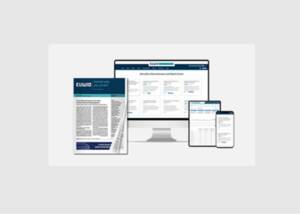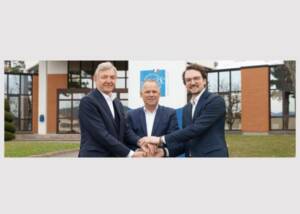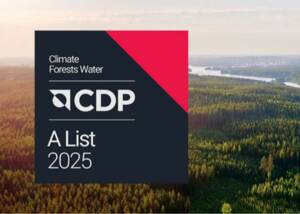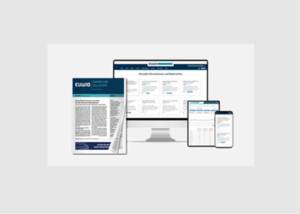Forum Wellpappe Austria: Sustainable packaging. Good, better, with corrugated board!
News General news
In 2020, the domestic corrugated board industry proved to be robust and stable. With more than 1 billion square meters of corrugated board, the industry achieved an increase in sales while revenues declined. The trend towards sustainable (online) packaging continues.
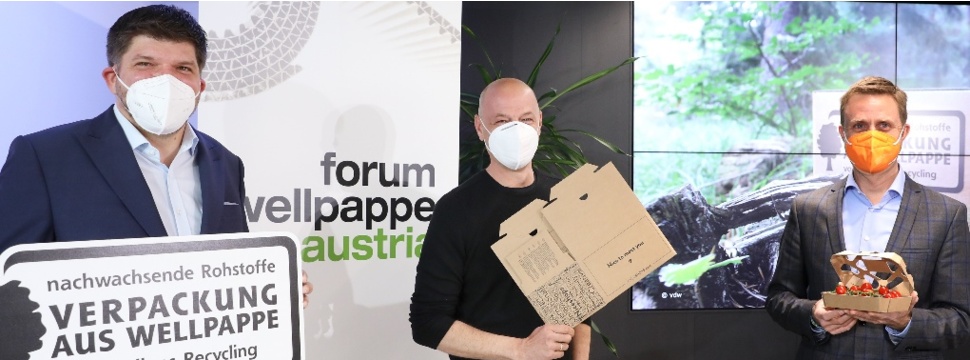
Whether food, beverages, clothing, sporting goods, books or computers - almost any product can now be ordered online and delivered directly. The pandemic makes it clear what is also true in normal times: nothing works in the supply chain without high-performance packaging. This makes corrugated board the No. 1 packaging material for transport - and there are good reasons for this: It is lightweight yet strong, versatile and can be printed with high quality, environmentally friendly and with an optimal price-performance ratio. A real security.
The year 2020 presented many companies with major challenges. The Austrian corrugated board industry came through the COVID 19 pandemic stable and robust. "We succeeded in ensuring both the health and safety of our employees and the performance of the entire industry," says Stephan Kaar, spokesman for Forum Wellpappe Austria.
Corrugated board can do more
Growing environmental awareness among both consumers and more and more retail companies is leading to increased demand for sustainable packaging solutions. "Corrugated board is clearly the number 1 here: we are innovative, economically efficient and ecologically sustainable, making it a real alternative to plastic," says Kaar. A study published by the Society for Packaging Market Research (GVM) estimates that "more than one-fifth of all fossil packaging could be replaced by clever solutions made of corrugated board," explains Kaar. "Annually, this would save more than 800,000 tons of plastic in Austria, Germany and Switzerland."
Sustainable by nature
According to the GVM study, three quarters of the foam components used in transport and shipping packaging could be replaced by elements made of corrugated board. Whether mail order or stationary retail - all goods must reach their destination undamaged. Transport packaging made of corrugated board is enormously efficient and ensures the necessary product protection to transport goods safely. In the fruit and vegetable packaging sector, "as much as 64 percent of packaging could be replaced by corrugated board," says Kaar.
Renewable raw material, full recycling
Recyclable corrugated board packaging contributes to climate protection and is the most important raw material for the production of corrugated board base paper. In Austria, 98.8 percent of used corrugated board packaging is collected and reprocessed into corrugated base paper. The paper fibers can be processed up to 25 times. "The domestic corrugated board industry thus makes an important contribution to a functioning circular economy," says Stephan Kaar.
Corrugated board packaging is generally mono-material packaging, which is why it is so easy to recycle: After use, they go into the waste paper. This not only applies to private households - corrugated board is also bundled by type in supermarkets and in industry and returned to the recycling loop.
Stable employment, more apprentices
Corrugated board companies proved themselves to be stable and secure employers last year. "Throughout the industry, there was only selective short-time work," reports Florian Döbl of Forum Wellpappe Austria. With the demand for corrugated board packaging, the need for well-trained employees is also increasing. In the past business year, the industry employed a total of 1,900 people at nine production sites in Austria. "Training young skilled workers is and remains particularly important for us," says Döbl. "Currently, domestic corrugated board companies are training 79 apprentices." The company plans to take on more than 30 new apprentices in 2021. Important apprenticeships include packaging technology, IT systems technology and operational logistics.
Stable corrugated board market in 2020
In 2020, the member companies of Forum Wellpappe Austria - DS Smith Packaging Austria, Dunapack Mosburger, Mondi Grünburg, Rondo Ganahl, Smurfit Kappa Interwell and Steirerpack - will have sold a total of over 1 billion square meters of corrugated board (1,043.6 million m2). This is 15.6 million square meters more than in 2019 and corresponds to a volume growth of 1.5 percent compared to 2019. Annual sales in 2020, on the other hand, recorded a slight decline of 3.6 percent to 553.4 million euros. "Decisive for this are two reasons: Shifts in product ranges due to Corona and short-term fluctuations on the raw material markets," reports Stephan Kaar.
The share of corrugated board packaging for online retailing was over ten percent in 2020. The trend is still upward. The largest customers for corrugated board continue to be the food and beverage industry (47.7%), followed by packaging for furniture, electrical appliances, machinery and vehicles (19.4%), and chemical products, cleaning and cosmetics (10.8%).In the first quarter of 2021, the industry is experiencing strong demand. However, the situation on the raw materials markets remains tense. For 2021, the Forum Wellpappe Austria spokesman expects "solid growth in the range of three to four percent."
Bold, successful, sustainable
Niceshops is an Austrian e-commerce company with around 400 employees. Every day, up to 20,000 parcels are sent all over the world from Paldau in southeast Styria. In the past financial year, the 100 million turnover mark was exceeded for the first time. The Styrian online retailer is also a multiple award-winning model company in social and ecological terms. "In the current challenging times, our business model has proven that we are ideally equipped for the future," says Roland Fink, founder of niceshops GmbH.
"In this context, sustainability is an integral part of our corporate culture. Since 2018, we have been operating in a certified climate-neutral manner. Among other things, we produce green electricity via a huge photovoltaic system and heat our company complex in Paldau through the neighboring biogas plant. When shipping our packages, we rely on plastic-free materials and, where possible, have changed the filling material to compostable material," says Fink.

